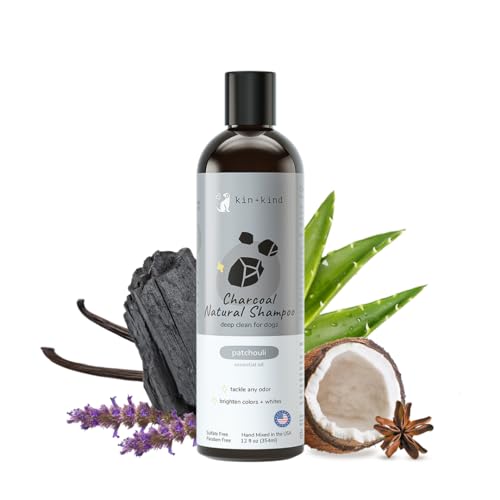
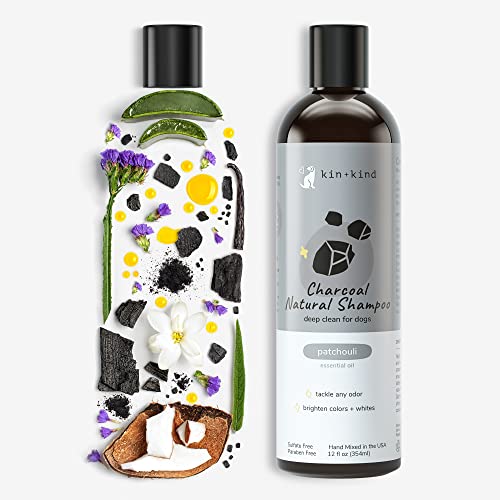
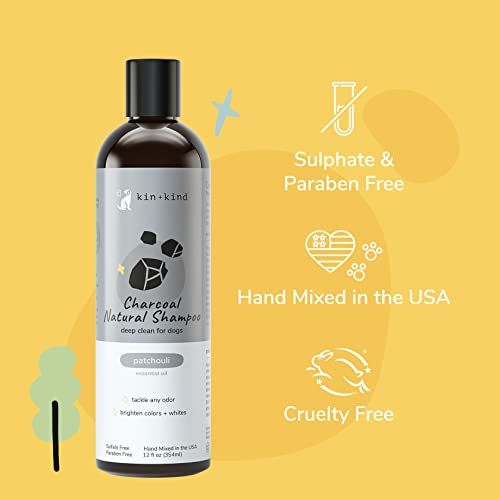
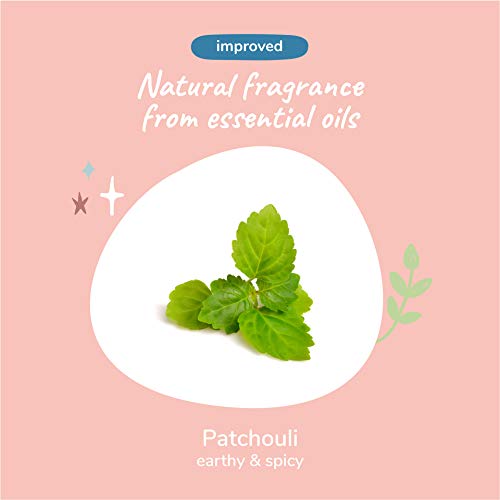
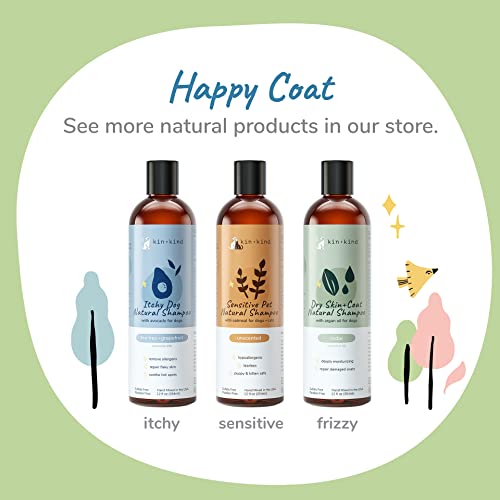
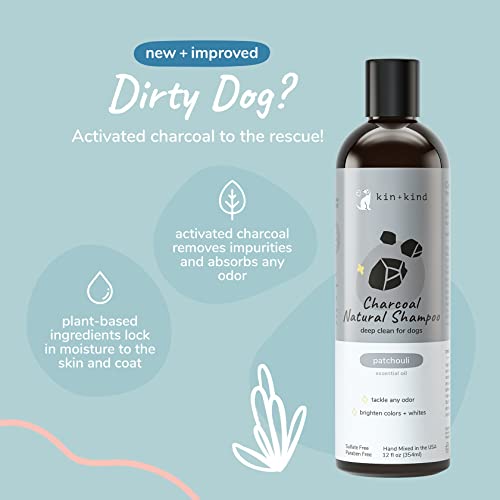
kin+kind Dog Shampoo - Deep Clean & Odor Remover with Activated Charcoal, Natural Oils - 12 fl oz


Carbon
High RiskCarbon is an amorphous form of elemental carbon commonly used in various products. It serves multiple functions, including acting as a pigment, filler, or adsorbent, depending on the formulation. Its versatile applications span across personal care, cosmetics, and other industries.
Sustai Insights
Carbon has functional benefits such as enhancing product texture and stability. It is generally considered low in health risks, with minimal concerns regarding carcinogenicity, allergies, and reproductive toxicity. However, its use is subject to high restrictions due to regulatory concerns about safety and environmental impact, including potential pollution and bioaccumulation. The overall risk associated with carbon is high, necessitating careful consideration in product use. Alternatives like plant-based pigments or biodegradable fillers may offer safer options.
Unspecified Botanical Oil(s)
Medium RiskUnspecified botanical oils are natural extracts derived from various plant sources, commonly used in cosmetic and personal care products for their moisturizing, emollient, and fragrance properties. These oils can serve multiple functions, including enhancing product texture and providing skin benefits.
Sustai Insights
Unspecified botanical oils offer functional benefits such as moisturizing and emollient properties, contributing positively to product texture. Sustainability can be affirmed if sourced ethically. Health risks are low for carcinogenicity, allergies, and reproductive toxicity. Environmental concerns are minimal; however, regulatory bodies advise cautious use. Overall, the ingredient has a medium risk level, and users should consider alternatives like specific plant oils with established safety profiles.
Vegetarian Glycerin
Low RiskVegetarian glycerin, also known as glycerol, is a colorless, odorless, and viscous liquid derived from plant sources. It is primarily used as a humectant, solvent, and emollient in various personal care products, helping to retain moisture and improve texture.
Sustai Insights
Vegetarian glycerin offers functional benefits as an effective humectant, promoting hydration and skin smoothness. It is biodegradable and typically sustainably sourced. Health risks associated with glycerin are low, with no significant concerns for carcinogenicity, allergens, or reproductive toxicity. Environmental risks are minimal, and it is not subject to major regulatory warnings. Overall, the risk level for this ingredient is low, making it a safe choice in formulations. Safe usage practices include ensuring proper concentrations in products, and alternatives such as propylene glycol exist but may have differing properties.
Hydroxyethylcellulose
Low RiskHydroxyethylcellulose is a modified cellulose polymer used primarily as a thickening agent and stabilizer in various cosmetic and personal care products. It is soluble in water and helps to improve the texture and viscosity of formulations, enhancing their usability and performance.
Sustai Insights
Hydroxyethylcellulose offers functional benefits such as effective thickening and stabilization in formulations, contributing to product texture. It is generally considered low-risk in terms of health, with minimal concerns regarding carcinogenicity, allergens, or reproductive toxicity. Environmentally, it poses low risks and is not known to be bioaccumulative. Regulatory bodies have not imposed significant restrictions on its use. Safe practices include adhering to recommended concentrations, and while alternatives exist, hydroxyethylcellulose remains a low-risk ingredient overall.
Glyceryl Caprylate
Low RiskGlyceryl caprylate is a monoester of glycerin and caprylic acid, commonly used in cosmetics and personal care products as an emulsifier and skin-conditioning agent. It helps stabilize formulations and improve the texture and feel on the skin.
Sustai Insights
Glyceryl caprylate offers functional benefits as an effective emulsifier and skin-conditioning agent, enhancing product performance. It is biodegradable and considered sustainably sourced. Health risks are low, with minimal concerns regarding carcinogenicity, allergenic potential, and endocrine disruption. Environmental risks are also low, with no significant pollutant or bioaccumulation potential identified. Regulatory status is favorable, with no major restrictions. Overall, glyceryl caprylate maintains a low risk profile, making it a suitable ingredient for use in cosmetic formulations.
Water
Low RiskWater is a clear, colorless liquid essential for various biological processes. It serves as a solvent in formulations, facilitating the dissolution of other ingredients and enhancing product texture and application. Additionally, water plays a crucial role in hydration and is a key component in many cosmetic and personal care products.
Sustai Insights
Water is an effective solvent and hydrator, contributing to the texture and efficacy of formulations. It is biodegradable and generally regarded as safe, with low concerns regarding carcinogenicity, allergies, and reproductive toxicity. However, excessive water usage can lead to environmental concerns, particularly regarding resource depletion. Regulatory bodies do not impose restrictions on water use in cosmetics. Overall, the risks associated with water are low, making it a safe and essential ingredient.
Pogostemon Cablin (Patchouli)
Low RiskPogostemon cablin, commonly known as patchouli, is an aromatic plant widely used in perfumery, cosmetics, and traditional medicine. Its essential oil is extracted from the leaves and is valued for its distinctive scent and potential benefits in fragrance formulations and skin care products.
Sustai Insights
Patchouli oil offers functional benefits as a fragrance and potential antimicrobial agent. It is derived from a renewable source, contributing to sustainability. Health risks are minimal, with low concerns regarding carcinogenicity, allergies, and reproductive toxicity. Environmental risks are also low, with no significant pollutant or bioaccumulation concerns. Regulatory status is favorable, as it is not heavily restricted. Overall, the risk level associated with patchouli oil is low, making it a suitable ingredient in various applications.
Sodium Cocoate
Low RiskSodium cocoate is the sodium salt of fatty acids derived from coconut oil. It is primarily used in cosmetic formulations as a surfactant and cleansing agent, effectively helping to emulsify oils and fats, contributing to the overall texture and performance of the product.
Sustai Insights
Sodium cocoate acts as an effective surfactant and cleansing agent, offering functional benefits in personal care products. It is biodegradable and derived from renewable sources, contributing to sustainability. Health risks are low, as it is not associated with carcinogenicity, significant allergenic potential, or reproductive toxicity. However, it may cause mild irritation to skin, eyes, or lungs. Regulatory bodies have not imposed significant restrictions, affirming its safety for use. Overall, it presents a low-risk profile, making it a suitable choice in formulations.
Sodium Olivate
Low RiskSodium olivate is a sodium salt of the fatty acids derived from olive oil. It serves primarily as a surfactant and emulsifier in cosmetic formulations, helping to stabilize mixtures and enhance product texture.
Sustai Insights
Sodium olivate offers functional benefits such as effective emulsification properties, contributing to the stability and texture of cosmetic products. It is derived from olive oil, which is often considered sustainably sourced and biodegradable. Health risks associated with sodium olivate are low, with minimal concerns regarding carcinogenicity, allergies, or reproductive toxicity. Environmental risks are also low, as it is not known to be a pollutant or bioaccumulative. Regulatory status is clear, with no significant restrictions noted. Overall, it is considered a low-risk ingredient, suitable for use in various formulations.
Potassium Citrate
Low RiskPotassium citrate is a potassium salt of citric acid, commonly used in food, beverages, and cosmetic products as a buffering agent and preservative. It helps maintain pH levels and enhances flavor stability, while also serving as a source of potassium in dietary applications.
Sustai Insights
Potassium citrate offers functional benefits as a buffering agent and preservative, with low potential for health risks such as carcinogenicity, allergies, or reproductive toxicity. Environmentally, it presents minimal risks, being non-bioaccumulative and not contributing significantly to pollution. Regulatory bodies have not imposed major restrictions on its use. Overall, the risk level associated with potassium citrate is low, and it is generally regarded as safe when used appropriately. Alternatives may include other potassium-based salts, though potassium citrate remains a well-regarded option.
Vegetarian Glycerin
Low RiskVegetarian glycerin, also known as glycerol, is a colorless, odorless, and viscous liquid derived from plant sources. It is primarily used as a humectant, solvent, and emollient in various personal care products, helping to retain moisture and improve texture.
Sustai Insights
Vegetarian glycerin offers functional benefits as an effective humectant, promoting hydration and skin smoothness. It is biodegradable and typically sustainably sourced. Health risks associated with glycerin are low, with no significant concerns for carcinogenicity, allergens, or reproductive toxicity. Environmental risks are minimal, and it is not subject to major regulatory warnings. Overall, the risk level for this ingredient is low, making it a safe choice in formulations. Safe usage practices include ensuring proper concentrations in products, and alternatives such as propylene glycol exist but may have differing properties.
Hydroxyethylcellulose
Low RiskHydroxyethylcellulose is a modified cellulose polymer used primarily as a thickening agent and stabilizer in various cosmetic and personal care products. It is soluble in water and helps to improve the texture and viscosity of formulations, enhancing their usability and performance.
Sustai Insights
Hydroxyethylcellulose offers functional benefits such as effective thickening and stabilization in formulations, contributing to product texture. It is generally considered low-risk in terms of health, with minimal concerns regarding carcinogenicity, allergens, or reproductive toxicity. Environmentally, it poses low risks and is not known to be bioaccumulative. Regulatory bodies have not imposed significant restrictions on its use. Safe practices include adhering to recommended concentrations, and while alternatives exist, hydroxyethylcellulose remains a low-risk ingredient overall.
Glyceryl Caprylate
Low RiskGlyceryl caprylate is a monoester of glycerin and caprylic acid, commonly used in cosmetics and personal care products as an emulsifier and skin-conditioning agent. It helps stabilize formulations and improve the texture and feel on the skin.
Sustai Insights
Glyceryl caprylate offers functional benefits as an effective emulsifier and skin-conditioning agent, enhancing product performance. It is biodegradable and considered sustainably sourced. Health risks are low, with minimal concerns regarding carcinogenicity, allergenic potential, and endocrine disruption. Environmental risks are also low, with no significant pollutant or bioaccumulation potential identified. Regulatory status is favorable, with no major restrictions. Overall, glyceryl caprylate maintains a low risk profile, making it a suitable ingredient for use in cosmetic formulations.
Water
Low RiskWater is a clear, colorless liquid essential for various biological processes. It serves as a solvent in formulations, facilitating the dissolution of other ingredients and enhancing product texture and application. Additionally, water plays a crucial role in hydration and is a key component in many cosmetic and personal care products.
Sustai Insights
Water is an effective solvent and hydrator, contributing to the texture and efficacy of formulations. It is biodegradable and generally regarded as safe, with low concerns regarding carcinogenicity, allergies, and reproductive toxicity. However, excessive water usage can lead to environmental concerns, particularly regarding resource depletion. Regulatory bodies do not impose restrictions on water use in cosmetics. Overall, the risks associated with water are low, making it a safe and essential ingredient.
Carbon
High RiskCarbon is an amorphous form of elemental carbon commonly used in various products. It serves multiple functions, including acting as a pigment, filler, or adsorbent, depending on the formulation. Its versatile applications span across personal care, cosmetics, and other industries.
Sustai Insights
Carbon has functional benefits such as enhancing product texture and stability. It is generally considered low in health risks, with minimal concerns regarding carcinogenicity, allergies, and reproductive toxicity. However, its use is subject to high restrictions due to regulatory concerns about safety and environmental impact, including potential pollution and bioaccumulation. The overall risk associated with carbon is high, necessitating careful consideration in product use. Alternatives like plant-based pigments or biodegradable fillers may offer safer options.
Pogostemon Cablin (Patchouli)
Low RiskPogostemon cablin, commonly known as patchouli, is an aromatic plant widely used in perfumery, cosmetics, and traditional medicine. Its essential oil is extracted from the leaves and is valued for its distinctive scent and potential benefits in fragrance formulations and skin care products.
Sustai Insights
Patchouli oil offers functional benefits as a fragrance and potential antimicrobial agent. It is derived from a renewable source, contributing to sustainability. Health risks are minimal, with low concerns regarding carcinogenicity, allergies, and reproductive toxicity. Environmental risks are also low, with no significant pollutant or bioaccumulation concerns. Regulatory status is favorable, as it is not heavily restricted. Overall, the risk level associated with patchouli oil is low, making it a suitable ingredient in various applications.
Sodium Cocoate
Low RiskSodium cocoate is the sodium salt of fatty acids derived from coconut oil. It is primarily used in cosmetic formulations as a surfactant and cleansing agent, effectively helping to emulsify oils and fats, contributing to the overall texture and performance of the product.
Sustai Insights
Sodium cocoate acts as an effective surfactant and cleansing agent, offering functional benefits in personal care products. It is biodegradable and derived from renewable sources, contributing to sustainability. Health risks are low, as it is not associated with carcinogenicity, significant allergenic potential, or reproductive toxicity. However, it may cause mild irritation to skin, eyes, or lungs. Regulatory bodies have not imposed significant restrictions, affirming its safety for use. Overall, it presents a low-risk profile, making it a suitable choice in formulations.
Sodium Olivate
Low RiskSodium olivate is a sodium salt of the fatty acids derived from olive oil. It serves primarily as a surfactant and emulsifier in cosmetic formulations, helping to stabilize mixtures and enhance product texture.
Sustai Insights
Sodium olivate offers functional benefits such as effective emulsification properties, contributing to the stability and texture of cosmetic products. It is derived from olive oil, which is often considered sustainably sourced and biodegradable. Health risks associated with sodium olivate are low, with minimal concerns regarding carcinogenicity, allergies, or reproductive toxicity. Environmental risks are also low, as it is not known to be a pollutant or bioaccumulative. Regulatory status is clear, with no significant restrictions noted. Overall, it is considered a low-risk ingredient, suitable for use in various formulations.
Potassium Citrate
Low RiskPotassium citrate is a potassium salt of citric acid, commonly used in food, beverages, and cosmetic products as a buffering agent and preservative. It helps maintain pH levels and enhances flavor stability, while also serving as a source of potassium in dietary applications.
Sustai Insights
Potassium citrate offers functional benefits as a buffering agent and preservative, with low potential for health risks such as carcinogenicity, allergies, or reproductive toxicity. Environmentally, it presents minimal risks, being non-bioaccumulative and not contributing significantly to pollution. Regulatory bodies have not imposed major restrictions on its use. Overall, the risk level associated with potassium citrate is low, and it is generally regarded as safe when used appropriately. Alternatives may include other potassium-based salts, though potassium citrate remains a well-regarded option.
Unspecified Botanical Oil(s)
Medium RiskUnspecified botanical oils are natural extracts derived from various plant sources, commonly used in cosmetic and personal care products for their moisturizing, emollient, and fragrance properties. These oils can serve multiple functions, including enhancing product texture and providing skin benefits.
Sustai Insights
Unspecified botanical oils offer functional benefits such as moisturizing and emollient properties, contributing positively to product texture. Sustainability can be affirmed if sourced ethically. Health risks are low for carcinogenicity, allergies, and reproductive toxicity. Environmental concerns are minimal; however, regulatory bodies advise cautious use. Overall, the ingredient has a medium risk level, and users should consider alternatives like specific plant oils with established safety profiles.
Discover the kin+kind Dog Shampoo, a deep-cleaning solution infused with activated charcoal to remove dirt and odors while keeping your dog's coat soft and fresh. This gentle formula combines natural ingredients like aloe, olive oil, and coconut oil to pamper your furry friend.
- Deep Cleaning Power: Activated charcoal effectively cleanses your dog's coat, removing excess dirt and odors for a refreshing bath experience.
- Natural Ingredients: Made with plant-based, non-GMO ingredients, ensuring a safe and gentle wash that leaves your dog's fur silky soft.
- Essential Oil Infusion: Enjoy the earthy scent of Patchouli essential oil, providing a pleasant fragrance without harsh chemicals.
- Ethically Made: Proudly crafted in the USA, kin+kind products are cruelty-free and certified USDA organic, reflecting a commitment to sustainability and pet health.
- Easy to Use: Simple application steps make bath time a breeze, ensuring your dog feels clean and loved every time.
Subscribe & Save with Sustai
- Best Price Guarantee: Always enjoy the lowest prices on sustainable home essentials.
- No Surprises: We’ll notify you before shipping. No hidden fees, ever.
- You’re in Charge: Change, pause, or cancel your subscription anytime with ease.
- Eco-Friendly Deliveries: Our grouped shipments mean less packaging and lower emissions.
Join us on a sustainable journey. Special offers for a limited time! Prices and promotions may change.
Recommended Products
Discover the kin+kind Dog Shampoo, a deep-cleaning solution infused with activated charcoal to remove dirt and odors while keeping your dog's coat soft and fresh. This gentle formula combines natural ingredients like aloe, olive oil, and coconut oil to pamper your furry friend.
- Deep Cleaning Power: Activated charcoal effectively cleanses your dog's coat, removing excess dirt and odors for a refreshing bath experience.
- Natural Ingredients: Made with plant-based, non-GMO ingredients, ensuring a safe and gentle wash that leaves your dog's fur silky soft.
- Essential Oil Infusion: Enjoy the earthy scent of Patchouli essential oil, providing a pleasant fragrance without harsh chemicals.
- Ethically Made: Proudly crafted in the USA, kin+kind products are cruelty-free and certified USDA organic, reflecting a commitment to sustainability and pet health.
- Easy to Use: Simple application steps make bath time a breeze, ensuring your dog feels clean and loved every time.

You can have at most 2 Sustainable Steals products in your cart
Customer Reviews
Customers’ View
Customers appreciate the effectiveness and natural formulation of this dog shampoo, highlighting its ability to deeply clean while remaining gentle on their pets' skin. Many reviews commend its pleasant patchouli scent, which lingers well after bathing, with one customer noting that their dog's coat stays fresh for weeks. Additionally, users report that the shampoo leaves fur soft, shiny, and easy to brush, making it suitable for dogs with sensitive skin. While some customers mention a lack of lather, they still find the cleansing properties satisfactory. Overall, this eco-friendly and cruelty-free product aligns well with the values of health-conscious pet owners, providing a trusted choice for maintaining their pets' hygiene.
AI-generated from the text of customer reviewsThis product is rated 4.4 of 5.0 stars.
It has received 10 reviews.





